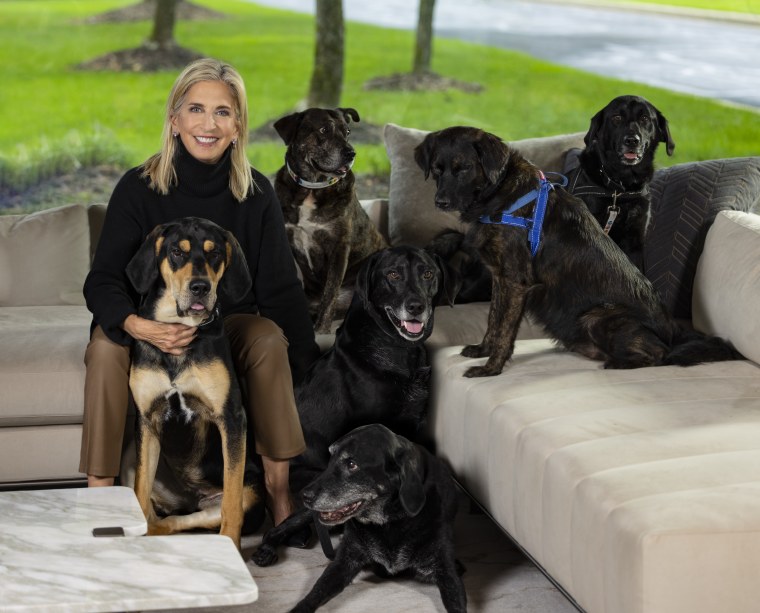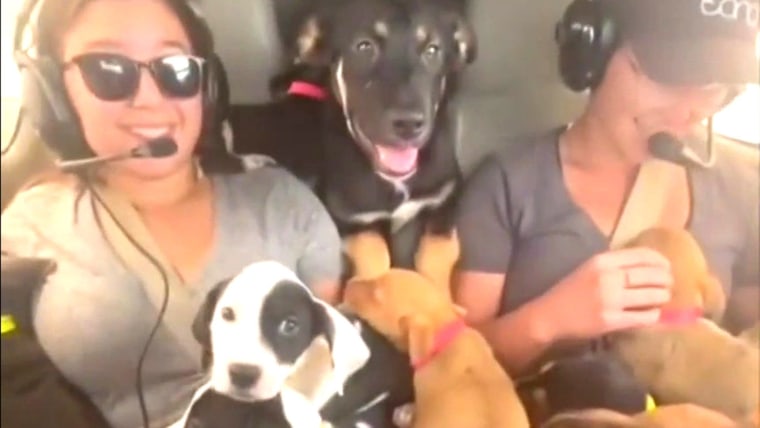Sometimes it takes a catastrophic event to create real change.
That was the case for Cathy Bissell, an animal lover who was working on the corporate side for the family’s company, BISSELL Homecare Inc., in Michigan, when Hurricane Katrina devastated the South in 2005.
A local animal shelter asked Bissell for help for a fundraiser in support of pets displaced from the hurricane. After touring shelters and learning more about homeless pets across the country, she was inspired and motivated, and began what she calls her “life’s calling” in animal welfare in her late 40s.
“It’s never too late to make a difference,” Bissell, 62, recently told Know Your Value founder Mika Brzezinski.
Bissell went on to create the BISSELL Pet Foundation, which provides supports through grants to animal shelters and rescues. Her efforts have impacted over 380,000 pets since the foundation’s inception in 2011. The organization is celebrating its 10-year anniversary this month.
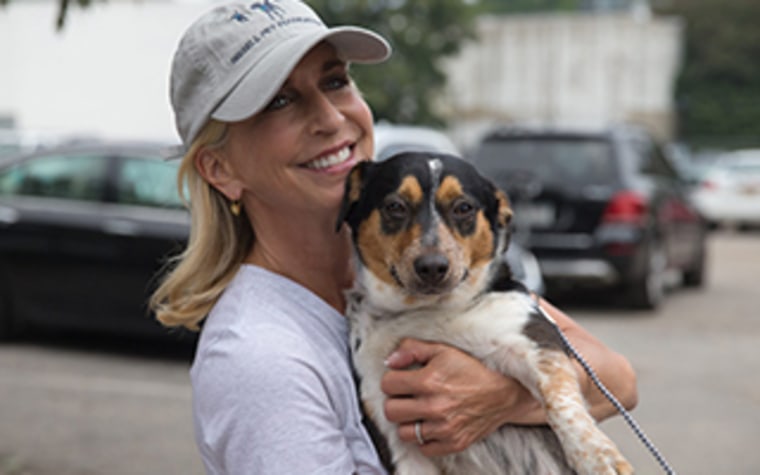
As part of Know Your Value's "Women In Charge" series, Bissell chatted with Brzezinski (who also rescued family dog Cajun from Hurricane Katrina) about finding her passion, making the transition from fashion in New York City to BISSELL and animal rescuing, navigating her career in her 50s and beyond, her best advice for young women and more.
Below is their conversation, which has been edited for brevity and clarity:
Mika Brzezinski: You went from working in fashion in New York City, to returning to Michigan and working as a fashion reporter in Grand Rapids, to working at BISSELL Homecare. Was that a big transition for you? I deal with a lot of women who struggle with embracing change.
Cathy Bissell: …I met my husband when I was in college, and his name is Mark Bissell. We had moved to New York city together. And I did end up in the magazine world for Harper's Bazaar and GQ … Then eventually, the BISSELL roots wanted us to come back to Michigan … It was hard to leave New York City and to leave such a great job …
I came back here … and I would go into the stores and see some Bissell products on the shelf. And there'd be like a girl in a miniskirt from like the 60s. [I’d say,] “OK, has anybody thought about changing the packaging here?” … So I became very vocal at the company [in both product development to changing marketing efforts] … I'm very opinionated, and I just kept telling them what I thought that they should do. Of course, it was a man's world at that point, and they weren't really interested in my views, but they humored me. And eventually my husband who took the company over, you know, he believed in my ideas, he liked my taste. He liked my thoughts. Thank God I had someone believing in me. And so that's how things started to change a little bit …
Brzezinski: That’s so good to have that kind of support in the family. Tell me about how your love of animals and rescuing them came into your life.
Bissell: I grew up with pets. We had bunnies, we had ducks, we had dogs … I just loved animals.
… I went off to college, and I wanted to be a vet, and so I worked for a large animal vet, and that was really great. I loved that until I had to euthanize a dog in front of an 8-year-old boy. And the vet wouldn't let me leave the room. And I just said, “This is too tough. I just can't euthanize a dog for no reason.” They were moving away, and they didn't want anyone to have their pet.
It was different back then. You know, I'm 62. So, this was a long time ago. Veterinarians don't really do this today. They find a home for the dog, but back then it was a little bit different.
…When I came back to Grand Rapids, I was keeping myself very busy. But [Hurricane] Katrina [in 2005] is what changed me … Katrina hit and all these dogs were displaced. And of course, people were going into Louisiana, pulling as many dogs to safety as possible.
I decided to go to [a local Michigan shelter that had received evacuated dogs from Louisiana as a result of Hurricane Katrina], and I started taking photographs of the dogs to see if we could make sure that if they were owned by somebody, they would make their way back home. And that's what got me into the shelter for the first time. I had never been in a shelter before that.
… We started raising a lot of money, Katrina hit and then the foundation really started because we had enough money to give to more than one organization. We started to divvy it out and that's really where it happened. It was very sad to go in to take pictures, but I had a mission … I also was not a pit bull lover [at the time]. I was petrified of pit bulls, and pit bulls came up from Louisiana. And honestly ,they were the sweetest dogs. That changed my whole view of pit bulls. I own a pit bull now. They're the most wonderful dogs. So, that's how I got into rescue.
Brzezinski: That's amazing. I love that. And I can't believe you grew up in Michigan. You had dogs, cats and bunnies. I grew up in Englewood, New Jersey and then McLean, Virginia. I had dogs, cats, chickens, a horse, a bunny that had eight baby bunnies. We loved animals, so I get it.
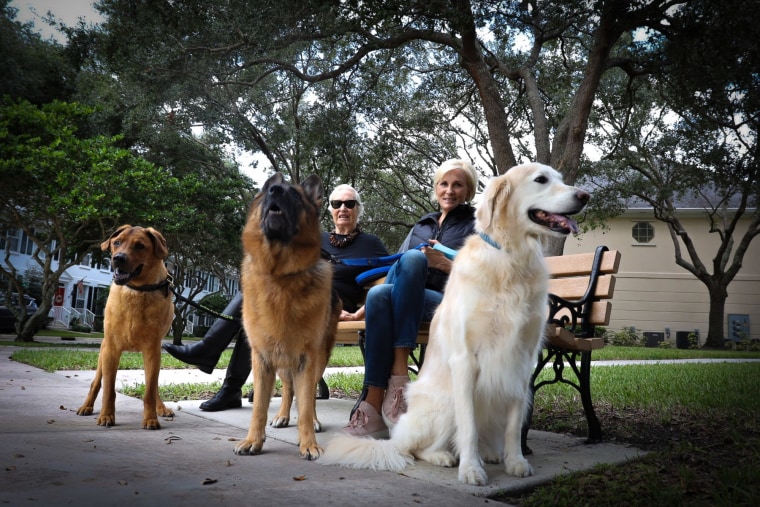
Bissell: … It’s great to have animals because it teaches you how to love. And it teaches you about loss because animals die before many people in your life. And so you learn to love an animal unconditionally, and then you also learn what it's like to lose an animal. And those are just things that in life you need to know…
Brzezinski: You've been able to take your foundation and intertwine it with Bissell. Talk about how you were able to do that and the decision to take on a project that initially maybe doesn't have complete synergy.
Bissell: It was really pretty interesting. Once I started visiting shelters, I felt more comfortable. So whenever my husband and I would travel, especially out west, I would visit shelters. And so one of the shelters in Denver, the man who was running it at the time, he challenged me. He's like, “We should team up. Bissell should give us some money every time somebody buys a product. We could take a cut of it.” And I'm like, “Well, the margins are pretty small. So I don't think that's going to be possible.” But … I kept thinking. And I said to my husband one morning, "what about online sales? We have a little bit more margin there. Could we start with giving to the foundation through online pet sales?" And he was like, "Yeah, we can do that." So that's how we started melding the two together.
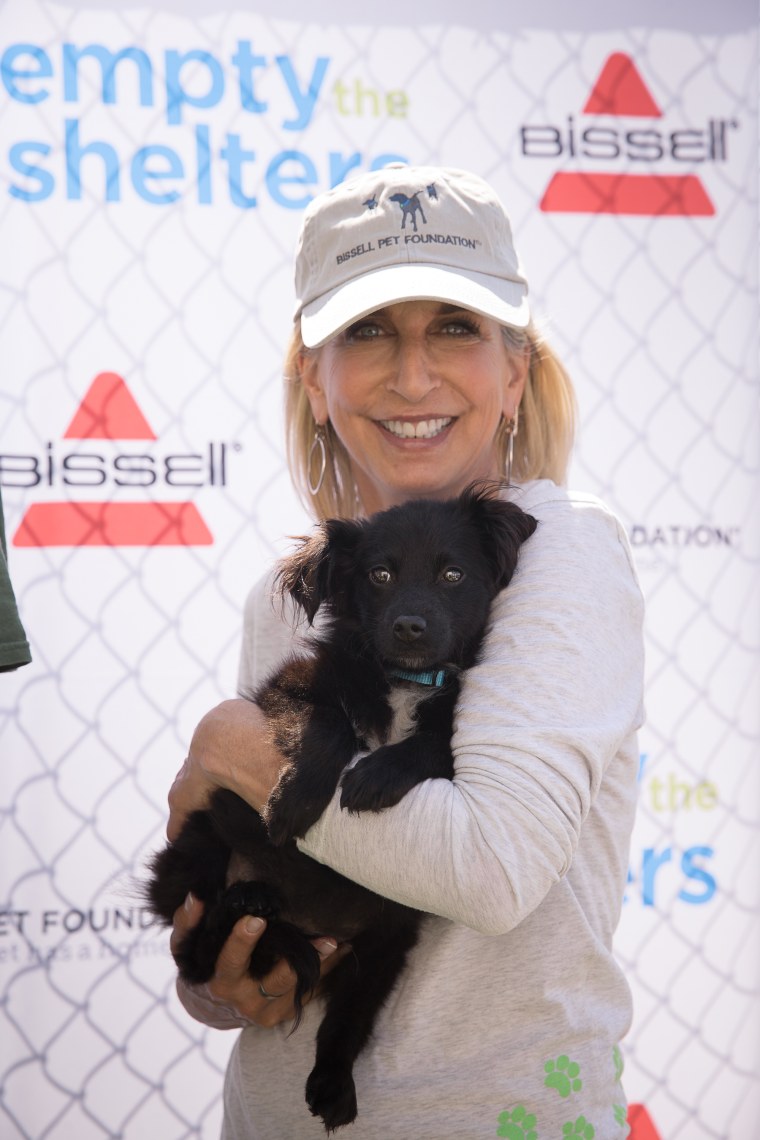
… It started to grow and we did $1, $5, and $10 depending on the product … And we always put adoptable pets on our boxes from that point on.
My first adopted dog was a black lab named Bear and he was regal and he was fantastic … I had asked the shelter why he was given up. He was given up because [his family] decided they wanted a puppy and he was 6 years old … [Meanwhile,] we’re making great products, they clean up after pets. And I really wanted to get the word out that you don't have to give your pets up if they make an accident in your house. You could buy our products and we will help you clean up. And I'm like the number one tester at the company, I test everything … I have animals that have big accidents, and I need to know that you can clean up a mess …
Brzezinski: The synergy is definitely there.
Switching gears, I just did a big partnership with Forbes magazine celebrating women over 50, women in their 60s, 70s, 80s and beyond who are achieving their greatest success in life and paying it forward.
The inaugural list came out this spring and one of the questions I love asking, did you ever plan or imagine your career after 50?
Bissell: No I didn't. I like to be a busy person, so I always imagined I was going to be active. I like to make a difference and I like to be involved, so I never thought about just doing nothing.
… I didn't know that this would be the change and I'm really happy because I have come full circle in my life. I feel like initially I wanted to be a vet … And as much as I love fashion and I love being in that world, and I had the best mentor, I feel like I'm really doing what I'm supposed to be doing and helping spread the word of adoption to people.
Brzezinski: That's awesome. I know one piece of advice you have for younger women is pay attention to people who you admire. Can you elaborate on this?
Bissell: When I moved to Grand Rapids, I was immediately taken by just how many great leaders there were in such a small community. There are so many people in West Michigan who have made it their mission to give back and really impact change. I jumped in and began serving on several boards, but I want to mention one in particular where I was a trustee at a local university. I was in awe of the dedicated staff and the Board of Trustees, and especially the woman in charge of development at the school who served as such a great example on how to fundraise and make it fun. I made a point to take-in as much information from these incredible people as possible, and I would listen as much as I could during the meetings.
My advice is to pick multiple people you admire and learn from them. Make a point to share space with them and absorb as much as you can. This could even be a grandparent or a neighbor. See how they talk, interact with people, pay attention to them. There are so many things you can admire about other people. If you know someone you wish to emulate and can’t be in their space, find ways to still follow and study them – read books by them, listen to interviews they’ve done, follow on social media. Take-in as much knowledge as possible and never stop learning.
